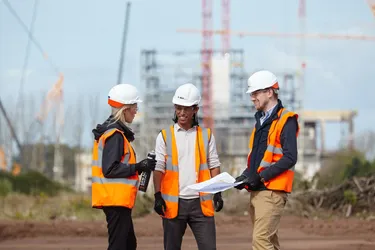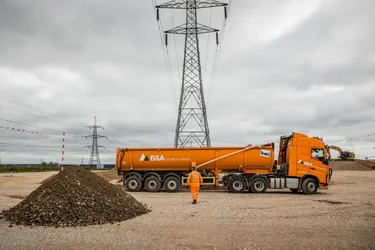
Every project requires the right aggregate. Aggregate impacts everything related to your construction, from cost, carbon footprint and durability. It's vital, whether you are constructing a new road, laying foundations or resurfacing the drive, that the materials are of an appropriate type for the project. This article explores the options for aggregate types based on every project.
Aggregates: what are they and why should they matter?
Aggregates are the backbone of all your construction projects. Examples of these are gravel, crushed stone, sand, ballast or recycled concrete. Their role is to provide the foundation in construction for a building in terms of strength, structure, drainage, and stability.
Here are the two main types of aggregates:
1. Quarried aggregates are natural materials extracted from the earth by various quarrying operations.
2. Recycled aggregates are obtained by processing old concrete, bricks, asphalt, and other similar demolition materials into a usable state again.
They are both comparable in strength. The type of aggregate you choose will be based on your needs, budget, and objectives.
Quarried aggregates
Quarried aggregates are sourced from rock quarries. This consists of natural materials such as limestones, granites, and sandstones. They are uniform in quality, are abundantly available, and are durable for construction projects of all kinds.
Because they come from natural resources and are carefully graded, quarried aggregates are largely uniform in size, shape, and strength. These properties are ideal for concrete production, motorway construction, or major infrastructure projects. Quarried aggregates are strong and consistent but come with an expense, particularly to the environment. Quarrying can be intensive on local ecosystems, and this is highly dependent on energy and transport, resulting in high carbon emissions.
What are recycled aggregates?
At B&A group, we are committed to the highest environmental practices with all our products. Learn more. Recycled aggregates provide a greener option. They are made of crushed and recycled construction and demolition waste (old bricks, asphalt, old concrete etc.). Most commonly, you would find them recycled instead of landfilled.
In recent years, this aggregation type has become quite popular with eco-friendly business owners and developers. Through the recycled aggregates that help waste management, reduce landfill use, and lessen construction impacts on the environment.
The aggregates are used in road sub-base, sewer bedding, pipe bedding, and landscaping projects. Though not as pure in color as a quarried stone, they are cheaper and have a minimal impact on the environment. In many industries, construction with such values is an important part of environmental responsibility as well as marketing of projects.
Comparing the two: key factors to consider
Let’s walk through the key differences to help you decide which is best for your project.
1. Environmental impact
If sustainability is your goal, recycled aggregates are a smart move. They keep waste out of landfills and reduce demand for newly quarried materials. Since they generally take less energy to produce, they support a sustainable economy.
Using recycled aggregates directly contributes to a sustainable economy, where waste materials are reused instead of discarded. This can also help with planning approvals, especially for environmentally sensitive developments.
2. Cost
Looking to manage costs? Recycled aggregates tend to be cheaper. You can avoid the expense of extraction, long-haul transport, and heavy processing, which is a real advantage for large-scale builds.
However, accessibility may vary depending on your location and the recycled material used in your construction. Get in touch with us today for more information regarding this.
3. Quality and consistency
Quarried aggregates are the option for high-spec builds. They’re mined to precise standards, offering reliable strength and uniformity, essential for critical infrastructure and performance-driven projects.
Recycled aggregates can vary more in composition, but that doesn’t mean they are inferior. With a trusted supplier and the right specs, they’re a solid choice for many everyday applications.
4. Durability and performance
If you’re working on a job that involves heavy loads or long-term wear and tear (think road bases, foundations, or reinforced concrete), these infrastructures often use quarried aggregates that offer tried-and-tested strength.
Recycled materials like Type 1 recycled (crushed concrete) have come a long way and perform well in many demanding infrastructures. Still, if your project’s success relies on maximum durability, quarried aggregates are the more accepted choice.
5. Project type and regulations
Some projects involving highways, railways, or structural frameworks have strict guidelines on aggregate use. Local authorities and developers sometimes specify quarried aggregates to meet regulatory standards.
However, many sustainable building frameworks and councils now encourage or require recycled content to achieve green building benchmarks.
Check the project specifications before ordering. In choosing the right aggregate, use the best material for the project.
Recycled aggregates are ideal if your project prioritises sustainability, cost savings, and environmental impact. If strength, uniformity, or regulatory approval are your priorities, quarried aggregates may be worth the extra investment. In many cases, the smartest choice is a blend of both types. Use recycled materials where you can, and save quarried stone where needed.
Choose the right aggregate for your project
Choosing between recycled and quarried aggregates isn’t just about price or availability but also about building responsibly. Every decision on a construction site impacts the project and the environment. Looking for the right type requires a reliable and knowledgeable supplier. A reliable aggregate partner will help you balance performance with sustainability and provide options.
Ready to source the right aggregates for your next project? Whether you’re going green or strong, we can provide high-quality, sustainable materials for every project.
Contact us here for quotes, or more information on aggregates, aggregate delivery and much much more.


